|
|
|
Sort Order |
|
|
|
Items / Page
|
|
|
|
|
|
|
| Srl | Item |
| 1 |
ID:
105620
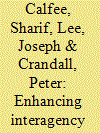

|
|
|
| 2 |
ID:
161348
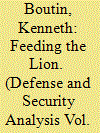

|
|
|
|
|
| Summary/Abstract |
In analysing trends in Chinese defence engagement and their impact on defence development in African states, it is important to consider both China's changing policy priorities and its capabilities for the provision of defence support. China's international ambitions and its economic development contribute to its emergence as a key supporter of defence capability development in Africa, occupying a crucial niche as a provider of support, particularly arms transfers, appropriate to evolving local requirements. The economic and politico-military imperatives driving China's engagement of Africa, which stem from its economic reforms and re-emergence as a great power, are facilitating defence modernisation by accelerating the introduction of modern arms in substantial quantities. The commercial importance of arms exports and the growing importance of strategic ties strongly situate China to help sustain processes of defence capability development in African states over the long term.
|
|
|
|
|
|
|
|
|
|
|
|
|
|
|
|
| 3 |
ID:
174419


|
|
|
|
|
| Summary/Abstract |
International efforts to reconstruct weak states after war have increased in recent years. These endeavors often focus on rebuilding militaries given the importance of strong and professional militaries in preventing conflict relapse. What explains variation in military-building outcomes in post-conflict states? The literature on statebuilding and security sector reform suggests a number of factors that are thought to ameliorate statebuilding dilemmas. This article identifies three central mechanisms from the literature and evaluates them using evidence from a case study of post-conflict army-building in Liberia. The findings show that the voluntary nature of cooperation matters strongly for the successful outcome in Liberia, as does donor identity, albeit differently than as predicted by theory. The role of local ownership receives somewhat weak support, however, which is surprising in light of its importance in the literature. These results have significant implications for theories of statebuilding and security assistance policies.
|
|
|
|
|
|
|
|
|
|
|
|
|
|
|
|
| 4 |
ID:
168850
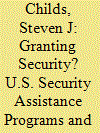

|
|
|
|
|
| Summary/Abstract |
U.S. security assistance programs are expected to increase the capabilities of partners in the Middle East and Africa by leveraging the provision of armaments and training through foreign aid. Can policymakers increase their reliance on such programs to achieve foreign policy aims of promoting regional stability while retaining political flexibility? Using multivariate logistic regression of Middle East and African states spanning 1970 to 2015, the empirical findings suggest that U.S. programs geared toward education and training are more positively correlated with stability than programs oriented toward providing hardware.
|
|
|
|
|
|
|
|
|
|
|
|
|
|
|
|
| 5 |
ID:
112635
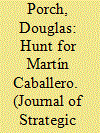

|
|
|
|
|
| Publication |
2012.
|
| Summary/Abstract |
While the success of Colombia's fight against illegal armed groups, led by Fuerzas armadas revolucionarias de Colombia - ejército del pueblo (FARC-EP), is generally lauded as evidence of the effectiveness of both COIN doctrine and security assistance, the configuration of Colombia's counter-insurgency effort remains largely unstudied. This article will explain the success of one of those campaigns carried out principally by the Colombian marines (Colmar) in an area of northern Colombia known as the Montes de María. Contingent factors shaped the success of this campaign, beginning with the fact that the Montes de María forms an area where insurgents, relative late comers to the region, found it difficult to put down deep roots. However, operations to eradicate them were complicated by the inexperience of the Colmar, and by constraints placed by Colombia's Constitutional Court on COIN methods modeled on those successfully applied by the British in Malaya and Kenya. Therefore, Colmar officers initiated their five-year campaign by building up a base of popular support in the towns and targeting insurgent logistical networks. This bought time to strengthen the Colmar's combat and intelligence capabilities, and take the offensive that eventually isolated and killed the leader of the FARC in the Montes de María, Martín Caballero. Unfortunately, the failure of the Colombian government to follow up the Colmar victory by installing a regional and local governments viewed as legitimate by the population, and to resolve long standing land tenure issues, has meant that, so far, the Colmar looks to have delivered a tactical victory in a strategic vacuum.
|
|
|
|
|
|
|
|
|
|
|
|
|
|
|
|
| 6 |
ID:
178641
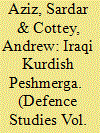

|
|
|
|
|
| Summary/Abstract |
During the war against Islamic State from 2014 to 2017 the Iraqi Kurdish Peshmerga became important local allies of the United States and its international partners, playing a significant role in the eventual defeat of Islamic State. In 2017, backed by the US and its Western allies, the Kurdistan Regional Government (KRG) agreed plans to reform and modernize the Peshmerga. This article provides an analysis of this reform process. Reform is severely constrained by two problems. First, the continuing soft civil war between Iraqi Kurdistan’s two main political parties, the Kurdish Democratic Party (KDP) and the Patriotic Union of Kurdistan (PUK), within which both parties view their maintenance of independent Peshmerga forces as central to their power and political survival. Second, the heroic-mythic status of the Peshmerga within Iraqi Kurdish society, which makes it difficult to convert the Peshmerga into a “normal” military force. Reform efforts to date have not addressed these issues. Until such time as the deep political divide between the KDP and the PUK is addressed, Peshmerga reform is unlikely to make significant progress – the military cart cannot be put before the political horse.
|
|
|
|
|
|
|
|
|
|
|
|
|
|
|
|
| 7 |
ID:
121504


|
|
|
| 8 |
ID:
188643


|
|
|
|
|
| Summary/Abstract |
This article explains changing patterns in police militarization in the Middle East and North Africa. It presents new data on police forces in nineteen countries in the region, 1946–2020, which demonstrate that police have become more militarized over time – increasingly adopting the weaponry, tactics, and organizational practices of military forces. The authors distinguish between the use of militarized riot squads and tactical units embedded within otherwise civilian police, to which they refer as “militarized civilian policing,” and more-extensively militarized “paramilitary” police. This study argues that while colonial legacies can help explain the ubiquity of paramilitary policing in former French colonies in particular, the increasing use of riot squads and tactical units in more recent decades has been driven in large part by concerns about military intervention in politics, as well as incentives created by international security assistance programs.
|
|
|
|
|
|
|
|
|
|
|
|
|
|
|
|
| 9 |
ID:
118209


|
|
|
| 10 |
ID:
161527
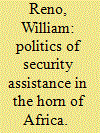

|
|
|
|
|
| Summary/Abstract |
This examination of international security assistance to Somalia points to the deficiencies of conventional security assistance strategies to partners in failed states and considers elements of an ad hoc alternative security assistance strategy. The social relationships among that state failure creates undermine the political will and capacity of recipients to utilize security assistance as providers intend. This consideration of developments in Somalia shows how domestic partners act in ways that frustrate efforts to build domestic security institutions. That record is manifest in persistent insurgent activities, even in Somalia’s capital city. The second part of this article explains how pragmatic efforts to fight Somalia’s Al-Shabaab insurgents create the outlines of an alternative security assistance strategy that bypasses elements of Somalia’s formal government structure and opts instead to rely on the creation of parallel security forces. While this strategy addresses a need to meet security objectives in the political environment of a failed state, it elevates tactical proficiency at the expense of strategic aims of conventional security assistance programs.
|
|
|
|
|
|
|
|
|
|
|
|
|
|
|
|
| 11 |
ID:
163760
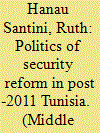

|
|
|
|
|
| Summary/Abstract |
In post—2011 Tunisia, the reform of the security sector has proceeded haphazardly, hindering security efficiency and lowering the overall effectiveness in countering threats. Since 2015, the combination of three factors — external shocks, international actors' pressures and domestic configurations of political power — have paved the way for a progressive overhaul of the efficiency of security agencies. Following the 2015 terrorist attacks, that destabilized the political system and risked derailing the trajectory of democratic consolidation, European powers exerted pressure to improve efficiency in the security sector. Lastly, these push factors needed an enabling condition, a strong presidency of the republic, to make the changes happen. The measures adopted reflect a technical and supposedly depoliticized view of reforms, in line with a broader post‐interventionist trend in Security Assistance. Based on process-tracing, the analysis of primary documents and several in‐depth interviews carried out between 2015 and 2017, the article illustrates the workings of the policy process in the security arena. It sheds light on the conditions that made possible the adoption of reforms, the role external actors played in pushing for change and in creating a new multilateral mechanism, the G7+, which produced an unintended set of domestic consequences.
|
|
|
|
|
|
|
|
|
|
|
|
|
|
|
|
| 12 |
ID:
175825
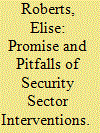

|
|
|
|
|
| Summary/Abstract |
Development practitioners and scholars have touted security sector reform (SSR) in Sierra Leone as a model for intervention. Twenty years after such reforms began, the West African country presents one with the opportunity to study the medium-term impact of SSR. This article argues that specialists should consider this SSR along five dimensions: security institution building, military reform and integration, internal security reform, professionalization, and disarmament, demobilization, and reintegration. This study further explores the impact these factors have had on security performance and legitimacy in the two decades since their implementation. Finally, this work concludes with an analysis of the current state of the security sector as well as a consideration of the lessons to be learned from the Sierra Leonean experience.
|
|
|
|
|
|
|
|
|
|
|
|
|
|
|
|
| 13 |
ID:
192614
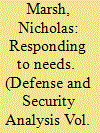

|
|
|
|
|
| Summary/Abstract |
The article analyses the provision of military aid to Ukraine during the first year after the 2022 Russian invasion and explains why it was more effective compared to other examples. It discusses the impact of material and intangible military assistance. The article examines tensions arising from principal-agent relationships between Ukraine and the states that provided support that may have affected what was provided and when it was delivered. It is notable that providers of assistance emphasised equipment rather than training, a choice that could be made because Ukraine had already built up a high level of combat skills and military organisation. The article argues that the distinctive aspects of military assistance to Ukraine that led to its impact were the quality and quantity of equipment provided, good communication and co-ordination between Ukraine and those states providing assistance, and that Ukrainian defence and government institutions could manage the aid provided.
|
|
|
|
|
|
|
|
|
|
|
|
|
|
|
|
| 14 |
ID:
159363


|
|
|
|
|
| Summary/Abstract |
Post-interventionist security assistance is premised on non-normative security understandings and flexible arrangements between external and local actors. In hybrid political regimes or areas of limited statehood, these forms of assistance, while strengthening specific aspects of a country’s security context, reinforce some domestic actors vis-à-vis others thanks to processes of selective borrowing by local political elites. This paper demonstrates how such processes contribute to the proliferation of hybrid elements in the country’s security sector. In two contrasting case studies, we illustrate how security assistance packages in Lebanon and Tunisia have diluted emerging democratic reforms, producing more coercive manifestation of state power.
|
|
|
|
|
|
|
|
|
|
|
|
|
|
|
|
| 15 |
ID:
080788


|
|
|
|
|
| Publication |
2008.
|
| Summary/Abstract |
From 1964 to 1975 a small group of British officers, advisors, and trainers guided the forces of the Sultanate of Oman to victory in their conflict with the Marxist insurgents of the People's Front for the Liberation of the Occupied Arabian Gulf (PFLOAG). This campaign provides a clear example of how to effectively support an ally's counterinsurgency efforts with a minimal commitment of men and material. In particular, the critical assistance provided by the British consisted of experienced leadership and skilled technical support personnel as well as a viable strategy for victory. However, more important for the ultimate success of the counterinsurgency campaign was the emergence of new progressive leadership with the accession of Sultan Qaboos. The most important lesson from this study is that while security assistance can reinforce positive political efforts, it is not enough on its own to bring about a victory in an unfavourable political environment
|
|
|
|
|
|
|
|
|
|
|
|
|
|
|
|
| 16 |
ID:
184206


|
|
|
|
|
| Summary/Abstract |
Training other countries’ armed forces is a go-to foreign policy tool for the United States and other states. A growing literature explores the effects of military training, but researchers lack detailed data on training activities. To assess the origins and consequences of military training, as well as changing patterns over time, this project provides a new, global dataset of US foreign military training. This article describes the scope of the data along with the variables collected, coding procedures, and spatial and temporal patterns. We demonstrate the added value of the data in their much greater coverage of training activities, showing differences from both existing datasets and aggregate foreign military aid data. Reanalyzing prior research findings linking US foreign military training to the risk of coups d’état in recipient states, we find that this effect is limited to a single US program representing a small fraction of overall US training activities. The data show comprehensively how the United States attempts to influence partner military forces in a wide variety of ways and suggest new avenues of research.
|
|
|
|
|
|
|
|
|
|
|
|
|
|
|
|
| 17 |
ID:
095969
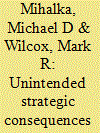

|
|
|
| 18 |
ID:
120903
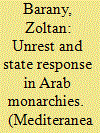

|
|
|
|
|
| Publication |
2013.
|
| Summary/Abstract |
The turmoil associated with the Arab Spring in the region's eight monarchies has received comparatively modest attention because, aside from Bahrain, the demonstrations were mostly small and nonconfrontational, there were few calls to overthrow the regimes, and states' coercive powers were applied with relative moderation. Behind these generalizations, however, lies a more complex reality: the extent of the strife was quite different, as were state actions to counter them across the eight cases. What explains these disparities? This essay argues that the differences in the levels of unrest are largely illuminated by varying degrees of societal support for monarchical regimes, deep-seated societal cleavages, and the deficiencies of political mobilization. The variation in state responses, in turn, is mainly explained by divergent financial resources, the quality of political leadership, and external diplomatic, financial, and security assistance.
|
|
|
|
|
|
|
|
|
|
|
|
|
|
|
|
|
|
|
|
|